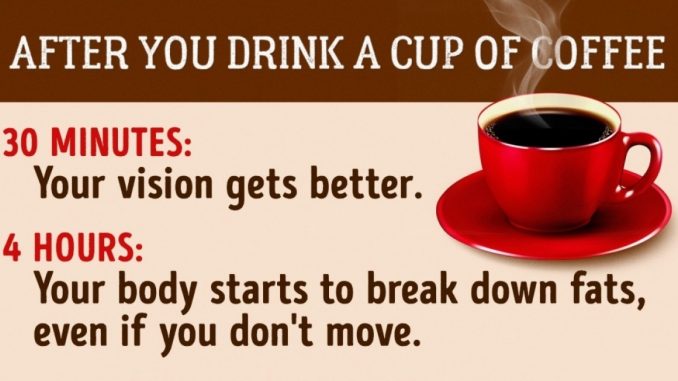Can you imagine your day starting without a cup of coffee? I guess not. If you are a lover of caffeine, you must read this article. Our team Go Fit Stay Fit is going to explain to you what happens to your body after drinking a cup of your favorite beverage
First 10 minutes:
The caffeine enters your bloodstream. Your heart rate and your blood pressure start to rise.
After 20 minutes:
You start to feel more alert and focused. You find it easier to make informed decisions and handle problems. Also, the caffeine can help you feel less tired by connecting to your brain’s adenosine receptors.
After 30 minutes:
Your body starts to produce more adrenaline. This can lead to sharper vision because your pupils dilate slightly.
After 40 minutes
The level of serotonin in your body begins to rise. This improves the functioning of the motor neurons which, in their turn, increase muscle straight.
4 Hours
Coffee can increase the rate at which your cells release energy. When this happens, your body starts to break down fats, even if you don’t move. Caffeine also stimulates and increases the production of stomach acid.
6 Hours
The caffeine causes a diuretic effect. Apart from water, your body also loses some essential vitamins and minerals. This can lead to slight disorders of calcium metabolism.
Our team is also going to give you 5 reasons why you should drink it every day:
1. Reduces the risk of developing type 2 diabetes
Researchers identified that drinking coffee increases plasma levels of the protein six hormone-binding globulin that controls the biological activity of the body’s six hormones which play a role in the development of type 2 diabetes. Drinking one cup of coffee a day lowers your risk of developing type 2 Diabetes by about 11 %. Those who drank two a day reduced their risk by 17%.
2. Drinking coffee makes your brain healthier.
It is found that just 3 cups of it a day can decrease the risk of developing Alzheimer’s disease, dementia, and Parkinson’s disease. The authors of the study concluded that “higher coffee and caffeine intake is associated with a significantly lower incidence of Parkinson’s disease.”
3. Great for your liver
It is known that consumers of coffee have a lower incidence of cirrhosis, especially alcoholic cirrhosis. Scientists found an inverse relationship between coffee drinking and blood levels of liver enzymes. Elevated levels of livers enzymes typically reflect inflammation and damage to the liver. The more coffee subjects drank, the lower their levels of enzymes.
4. Boosts your metabolism
Caffeine has been found to rev up metabolism and help you burn extra calories. So if you want to drop a few pounds, start your day with a cup of coffee.
5. Curbs depression
Multiple studies have linked coffee drinking to lower rates of depression.
Researchers aren’t sure how coffee seems to starve off depression, but it is known that caffeine activates neurotransmitters that control mood, including dopamine and serotonin.

